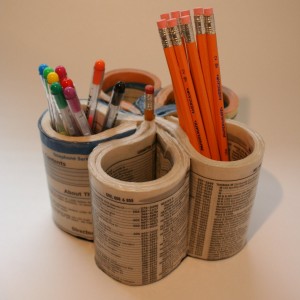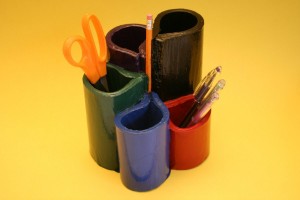Phone Books: A Jaundiced Look At Yellowed Pages
~ George Bernard Shaw
How many phone directories do you have in your home or office right now? Are any of them from prior years? (Decades?) Leaving aside their apt uses for leveling wobbly tables, serving as booster chairs and killing really large insects, how often do you actually use your paper telephone directories?

It used to be so simple in ye olden days. We had one phone company (Ma Bell) which annually delivered one phone book. The “white” directory was up front for residential land lines (back in the Pleistocene era before such wonders as cell phones and VOIP) and the “yellow” pages in back arranged businesses categories alphabetically. If you changed cities often enough, phone books provided a way to pass the time, giving you the fun task of trying to figure out if you needed a Hair Salon (“see Beauty”) or a Beauty Parlor (“see Hair”). Depending on your area of the country, houses of worship might be listed under R (for “Religious”) or W (for “Worship”), or merely under C for “Churches” arranged by denomination, with unintentionally bizarre rerouting sidebars, like “Churches-Jewish, see Synagogues”.
Occasionally, the directories had coupons (rarely for anything we ever wanted to buy) and as the years went on, a small “blue” section for government offices emerged, covering federal, state, city and county offices. The chance to entertain yourself with phone directory BINGO existed there, too, as the County Assessor’s Office would be found in the blue section, but the County Library branches were in the “yellow” pages.
The occasional public service announcement pages had their fair share of the standard “call before you dig” and “don’t do drugs” messages, though I must say I’m still struck by the advice in the Augusta, GA phone directory, almost two decades after originally reading the wise advice: “Do not stop to watch the tornado!”
THE CHANGING LANDSCAPE
A funny thing has happened to phone directories over the years. They’ve not only grown, but they’ve multiplied. If you live in a large enough suburb of a major city, you may get one complete “white” directory (the size of your years-ago phone book) and one “yellow” directory for the city, plus a traditional “combo” phone book for your suburb.
Then, in the likely event that your community is served by more than one phone company and/or directory publisher, you probably receive multiple phone books. Indeed, I receive six each year! To this day, Paper Doll cannot fathom why, if one assumes all directories for a region have the same phone numbers, any one book can be perceived as more useful than any other.
Beyond that, there are independent and even neighborhood phone directories, giving an ever increasing number of companies the chance to squeeze small businesses for advertising dollars. There’s AT&T’s “Real Yellow Pages”, which delivers a full-sized phone book (or two, if you live in the aforementioned “big” cities), plus a miniature version of the yellow section, which includes only businesses who have paid extra to be listed in the baby-sized book. There’s YellowBook, the most popular secondary phone book, no matter who your primary phone company might be, and directories with imprints like Idearc/Verizon and Dex.
PHONE BOOK ALTERNATIVES
The truth is, most of us don’t really need phone books cluttering up our spaces. There are easier, more convenient, more environmentally-sound options to get the numbers we need without having to make space for a steroidal paperback.
We can use The Official White Pages to look up residential phone numbers. (There’s no default directory, print or online, for cell phones, no matter what hoax emails you’ve received.)
Got a phone number, but don’t know to whom it belongs? Use a Reverse Phone Directory or just type the number (with area code, using an 123-555-1234 format) into Google, and if the number is published, the right name/address will pop up.
To find a business listing, merely use your favorite search engine to seek the company name (or business type) and city, or use any of a wide variety of online business directories operated by the same guys who publish the paper phone books: Yellow Book, AnyWho, YellowPages.com, or Super Pages.
For those of you who fear you might miss the sound of turning those gigantic pages, if you live within an AT&T service area, Real Pages Live has a semi-interactive, page-by-turning-page version of whatever geographic area’s phone book you’d like to see. You can select or type in the business category you want, and the web site will make a shhwoop-sound, show you the turning of the pages and then hone in on the section and listing you want. (You can also manually click the page corners if you can’t get enough of the shhwoop.)
If you’re out and about with your mobile phone and prefer texting to surfing, Google SMS allows you to send a text message to 466453 with the business name and zip code you’re seeking, and the system will send a phone number and address back to you.
Not near a computer or don’t have a fancy-schmancy smart phone that accesses the web? Try Google’s free service Google 411, where you dial 1-800-GOOG-411. The voice-recognition system asks you where you are (city and state), what business (and location) you’d like to find, and Google connects you. Don’t ask me how they can afford to do this for free, but they do!
Another alternative? Program 1-800-FREE-411 into your cell phone. You have to listen to a 10-second commercial, but then you get connected, for free, to a voice-recognition system with prompts so you can identify the business type and/or name and location you need. There are none of those pesky Directory Assistance charges, and there’s no need to search the house for your phone book. Unlike Google’s service, Free 411 can’t connect you, so you do need to have a pen handy to write down the number you’re given.
RECYCLING THOSE DOORSTOPS
Telephone directories are 100% recyclable. The papers are recycled into everything from new phone books (sigh…) to insulation, building materials, grocery bags, paper towels, cereal boxes, photocopy paper and envelopes. In fact, the return envelopes you receive for paying your phone bills are probably made from recycled telephone books. (Oy. Cue “Circle of Life“!)
However, while improvements in the publishing process make it much more likely that phone books will be accepted in your curbside recycling, not all community recycling stations are able to accept them. If that’s the case in your area, consider the following:
- Call 1-800-953-4400 to find a local or convenient drop-off recycling location.
- The environmental experts at Earth 911 offer a zip code search for recycling telephone books (as well as an array of other materials).
- Keep America Beautiful works directly with AT&T to promote recycling of their directories. Visit YellowPages.com/Recycle, type in your zip code, and the contacts for your nearest phone book recycling resources will come up.
- For the more artistically-inclined, there are even a myriad of phone book craft options on the web, like the Phone Book Pencil Cup Holder

 from project experts Chica & Jo. Ready Made Magazine even runs periodic MacGyver Recycling Challenge contests for creative recyclers, and one of their DIY contributors developed a Phone Book Planter
from project experts Chica & Jo. Ready Made Magazine even runs periodic MacGyver Recycling Challenge contests for creative recyclers, and one of their DIY contributors developed a Phone Book Planter  , suitable for miniature gardens.
, suitable for miniature gardens.
OPTING OUT
You can opt out of receiving telephone directories at your home. You might start by visiting Yellow Pages Opt Out, a site launched as joint effort of two trade groups, the Yellow Pages Association and the Association of Directory Publishers. Once there, enter your zip code and you will be provided with toll-free numbers to request the ability to change number of directories you receive or to remove yourself from the directory distribution lists entirely.
If you’d rather not have to make any calls, register with YellowPagesGoesGreen.org and they will forward your request to the appropriate publishers.
With either method, there are circumstances where your request may not be honored, however. If you live in an apartment complex or dormitory and your phone directories are dropped at your door rather than mailed (such that your phone book deliveries are not address-specific), it’s unlikely that you’ll be able to opt out.
Also, if your small business phone number is listed in the “yellow” pages, regardless of whether you’re paying separately for a display ad, it’s been my experience that no amount of pleading will stop copies of the directory being mailed to you.
THE FUTURE
Recycling helps deal with the problem we already have, and opting out may help slow the growth, but the best solution from a consumer perspective would be an opt-in process, so that only those who requested phone books would receive them. Grassroots measures for an opt-in program have popped up from San Francisco to Minneapolis, and Oregon’s Representatives Jules Kopel-Bailey and Ben Cannon sponsored a Oregon House Bill HB3477 (currently still in committee) to prohibit residential distribution of hard copy phone books without a prior opt-in.
While these measures, and efforts like the BanThePhoneBook.org initiative, are collecting online petition “signatures” to help create an opt-in system, Paper Doll is skeptical (and not only because BanThePhoneBook.org is sponsored by the online directory service, WhitePages.com, which is also advertising-supported, and thus a competitor to the paper behemoths).
The very ongoing existence of paper telephone directories is due to the willingness of businesses to purchase advertising space in the directories. Consumers may not want the phone books, and may never even use them, but business owners fear being the only one in their category without a phone directory presence. Even those of us who are only paying for our company’s phone number listing must understand that we are feeding the monster. Until or unless we all agree to eschew telephone books (not just using them, but buying the advertising), the phone books will keep on being published.
But at least we’ll have something that makes a satisfying thwak when we need to kill those really big bugs.




Follow Me